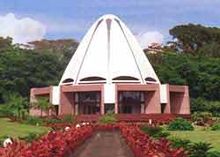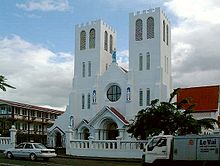- Religion in Samoa
-
 Bahá'í House of Worship, Tiapapata, Samoa.
Bahá'í House of Worship, Tiapapata, Samoa.
Religion in Samoa encompasses a range of groups, but nearly 100% of the population of Samoa is Christian.[1] The 2001 Census revealed the following distribution of Christian groups: Congregational Christian, 34.8 percent; Roman Catholic, 19.6 percent; Methodist, 15 percent; the Church of Jesus Christ of Latter-day Saints (Mormons), 12.7 percent; Assemblies of God, 6.6 percent; and Seventh-day Adventist, 3.5 percent.[1] These statistics reflected continual growth in the number and size of Mormons and Assemblies of God and a relative decline in the membership of the historically larger denominations.[1] The following groups constitute less than 5 percent of the population: Nazarene, Anglican, Congregational Church of Jesus, Worship Centre, Jehovah's Witnesses, Full Gospel, Peace Chapel, Elim Church, Voice of Christ, and Baptist.[1]
 Historic Methodist Chapel at Piula Theological College on Upolu island.
Historic Methodist Chapel at Piula Theological College on Upolu island.
There are also members of other religions such as Islam and the Baha'i Faith; the shared estimate of the Bahá'í population in Samoa circa 2000 according to a profile by the World Council of Churches and the online encyclopedia Encarta was 2% of the nation — some 3600 people — and the only non-Christian community of any number.[2][3] The country hosts one of only seven Baha'i Houses of Worship in the world.[1] The Baha'i Houses of Worship was dedicated by Malietoa Tanumafili II, King of Samoa (1913-2007), who was the first reigning Bahá'í monarch.[4] Although there were no official data, it is generally believed that there are also some practicing Hindus, Buddhists, and Jews in the capital city.[1]
All religious groups are multiethnic; none are composed exclusively of foreign nationals or native-born (Western) Samoans.[1] There are no sizable foreign national or immigrant groups, with the exception of U.S. nationals from American Samoa.[1] Missionaries operated freely within the country.[1] There is strong societal pressure at the village and local level to participate in church services and other activities, and financially support church leaders and projects.[1] In some denominations, such financial contributions often total more than 30 percent of family income.[1] The constitution provides for freedom of religion, and the government generally respected this right in practice.[1] The US government found there to be no reports of societal abuses or discrimination based on religious belief or practice in 2007.[1]
See also
- Bahá'í Faith in Samoa
- Roman Catholicism in Samoa
- Piula Theological College
References
- ^ a b c d e f g h i j k l m International Religious Freedom Report 2007: Samoa. United States Bureau of Democracy, Human Rights and Labor (September 14, 2007). This article incorporates text from this source, which is in the public domain.
- ^ "Samoa". WCC > Member churches > Regions > Pacific >. World Council of Churches. 2006-01-01. http://www.oikoumene.org/en/member-churches/regions/pacific/samoa.html. Retrieved 2008-06-15.
- ^ "Samoa Facts and Figures from Encarta - People". Encarta. Online. Microsoft. 2008. http://encarta.msn.com/fact_631504895/samoa_facts_and_figures.html. Retrieved 2008-06-15.
- ^ Bahá'í International Community (2007-05-14). "Funeral and memorial service planned for Samoan head of state". Bahá'í World News Service. http://news.bahai.org/story/543. Retrieved 2007-05-14.
Religion in Oceania Sovereign states Dependencies and
other territories- American Samoa
- Christmas Island
- Cocos (Keeling) Islands
- Cook Islands
- Easter Island
- French Polynesia
- Guam
- Hawaii
- New Caledonia
- Niue
- Norfolk Island
- Northern Mariana Islands
- Pitcairn Islands
- Tokelau
- Wallis and Futuna
Categories:
Wikimedia Foundation. 2010.

